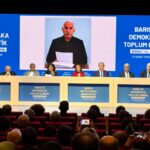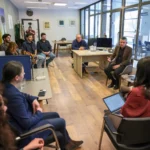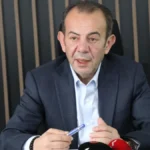JOE PARKINSON and ADAM ENTOUS / THE WALL STREET JOURNAL
In the months before Turkey’s failed coup, the country’s spy agency penetrated online chat rooms and decoded millions of secret messages but found no mention of the plot, senior Turkish intelligence officials said.
Agents checked tips pointing to a coup that led nowhere. Analysts studied the video sermons of an imam who the government alleges directed the plot and speculated if the color of his robes relayed secret orders to his followers.
Turkey’s spies, juggling terrorist threats from Islamic State and Kurdish separatists, struggled to make sense of clues that never seemed to add up until the conspiracy they feared most materialized on the night of July 15.
Failure to detect the coup revealed the limitations of Turkey’s spy agency, known as MIT, which is widely seen as operating a far-reaching domestic surveillance system that government critics allege serves to protect President Recep Tayyip Erdogan.
The challenge of sifting through a daily avalanche of electronic communications was compounded by encryption apps used by the alleged plotters, leaving Turkey’s spy service in the dark this year for several months.
U.S. intelligence agencies, whose work with the MIT is colored by distrust, also didn’t see the coup coming, officials said, even though it threatened to compromise the North Atlantic Treaty Organization’s second-largest army. The agencies saw only brewing political resentment, with U.S. surveillance of communications in Turkey focused on militants, not military officers.

Turkish authorities have singled out Pennsylvania-based religious leader Fethullah Gulen as the coup’s mastermind and launched a purge against tens of thousands of his alleged accomplices. They have demanded the U.S. grant extradition of Mr. Gulen to Turkey, adding to tension between the two nations.
Mr. Gulen and his organization Hizmet deny any role in the coup and have alleged Mr. Erdogan orchestrated it himself to build a dictatorship, a claim the president has denied.
Alp Aslandogan, who speaks on behalf of the imam, said claims that Mr. Gulen was involved were wrong, and if Mr. Gulen’s sympathizers participated in the coup, they did so without the cleric’s sanctions. The imam has repeatedly sought to distance himself from the coup, whose participants, he wrote in a newspaper op-ed this week, have “betrayed my ideals.”
American officials say they suspect followers of Mr. Gulen participated, but the U.S. doesn’t have access to primary sources in Turkey to determine independently who did what in the coup attempt. So far, they said, there is no credible evidence of Mr. Gulen’s personal involvement.
Some of Turkey’s Western allies have expressed concern that Mr. Erdogan is using the coup to widen the purge well beyond the alleged participants.
This account of the July 15 coup attempt that left 246 people dead in Istanbul and Ankara was based on interviews with senior Turkish intelligence officials, U.S. and other Western diplomats, and followers of Mr. Gulen.

Broken alliance
Long before Turkey’s spy agency turned its sights on Mr. Gulen, he and Mr. Erdogan were partners. The men had different Islamist philosophies but worked together, beginning in the late 1990s, to capture power from Turkey’s secular establishment.
To bolster Mr. Erdogan’s government and his own influence, Mr. Gulen asked his followers to seek leading roles in the bureaucracy.
At the peak of the partnership in 2010, the imam’s followers in the police, judiciary and media, helped jail hundreds of top military officers they accused of plotting a coup to remove the Islamist government.
The convictions were quashed years later, after revelations the evidence was fabricated. But it paved the way for Mr. Gulen’s sympathizers to rise to positions of power in the military, Turkish and U.S. officials said.
In 2012, the alliance between Mr. Erdogan and Mr. Gulen collapsed over disagreements about power sharing, sparking a feud that put the imam’s supporters under the scrutiny of MIT chief Hakan Fidan.

Inside Turkey’s spy agency, a group of senior analysts have since spent their days picking through intelligence on Mr. Gulen’s followers and analyzing the imam’s sermons—both words and gestures—for alleged hidden messages.
Mr. Gulen and his group had long frustrated the spy agency: Aware of MIT’s snooping, they imposed strict discipline over their communications, helped by military intelligence veterans fluent in the spy game.
Mr. Aslandogan, who speaks on behalf of Mr. Gulen, said the movement “has a problem with transparency” because of long-term persecution by the Turkish state.
The religious leader stopped using telephones and gave instructions in person to a handful of top advisers during visits to Mr. Gulen’s home in Pennsylvania. Ankara asked Washington to bar Mr. Gulen’s followers from entry into the U.S., but administration officials didn’t believe they posed a threat.
To avoid detection, the group in 2014 started using ByLock, an encrypted messaging app, according to senior Turkish intelligence officials.
“I have no direct knowledge of such a practice. If true, it might be that they are trying to avoid the wrath of the government,” said one person close to the movement.
The MIT discovered the communications channel last winter and began the laborious process of decrypting the messages, which numbered in the millions. The agency eventually identified 40,000 names, including 600 senior military officers, suspected of connections with the group.
None of the ByLock messages referred to a coup plot, senior Turkish intelligence officials said.
U.S. intelligence agencies knew of growing political opposition against Mr. Erdogan. A classified U.S. assessment included Turkey on a list of countries at heightened risk of political instability, but it didn’t predict a coup.
At the time, U.S. intelligence-gathering about Turkey focused on Islamic State and other terror threats, not the Turkish military.
Soon after the MIT gained access to the ByLock messages, operatives of Mr. Gulen’s organization realized the channel had been compromised and switched to a different messaging app that remained impenetrable, senior Turkish intelligence officials said. In early spring, the Turkish spy agency shared the decrypted files with other government ministries. Turkish intelligence officials said that tipped off Mr. Gulen’s group that the messages had been decoded.
Days later, on March 21, Turkish analysts saw a YouTube video that showed Mr. Gulen wearing for the first time a khaki robe the same green hue used by the army.
Analysts at MIT believed he was signaling his followers in the army, but they had no idea what. A person close to the Gulen group said such speculation was unfounded.
Plot revealed
Four days before the coup, the Turkish spy agency forwarded the names of the 600 military officers under suspicion to the military’s general staff. The plan was to sideline them during the annual meeting of military leaders in August.

Turkish and U.S. officials believe that warned the plotters their time was growing short.
In the late afternoon of July 15, analysts at Turkey’s spy agency got a tip of unusual troop movements at a Ankara’s airborne academy, as well as the Akinci Air Base 30 miles northwest of the capital.
Senior officers at the intelligence agency prepared a brief report and sent it by fax to the military’s general staff headquarters. Around 5:30 p.m., a senior intelligence official, Mr. Fidan’s deputy, went to the headquarters to share firsthand the agency’s suspicions about the troop movements.
A senior commander visited the academy and found that the attack helicopters had been armed with missiles. He was told it was for a military exercise. Suspicions lingered.
At 6 p.m., Mr. Fidan went to army headquarters, and Gen. Hulusi Akar, Turkey’s top soldier, agreed to visit the Akinci Air Base himself.
Mr. Fidan returned to MIT headquarters and waited to notify Mr. Erdogan, who was on vacation on Turkey’s Mediterranean coast.
Mr. Akar never reported back. He was taken hostage. Mr. Akar later said that a brigadier general who was part of the plot had urged him to speak with Mr. Gulen, and he had refused.
By 9 p.m., it was clear something dramatic was afoot. About an hour later, coup forces reached the MIT headquarters of Turkey’s spy agency.
Two Super Cobra attack helicopters and three Sikorsky troop movers carrying commandos raked the compound with cannon fire. Mr. Fidan was kept outdoors for fear jets would bomb the buildings. He and his staff, protected by armed security teams, took cover among trees.
When a Sikorsky descended to drop off commandos, agency bureaucrats, including those with little or no weapons training, fired handguns. Sparks flew from rounds ricocheting off the helicopter’s fuselage. “Fight until the last bullet, they shouldn’t capture you alive,” Mr. Fidan told his aides.
Between 1:30 a.m. and 2 a.m., members of the MIT’s security team brought heavy machine guns to fend off the helicopters. Defenders of the spy headquarters and the presidential palace used shoulder-fired missiles.
After the coup was thwarted, Mr. Erdogan publicly scolded his spy agency, raising questions about the future of its chief, Mr. Fidan. The highest-ranking military official accused in the plot is a four-star general and former commander of the Turkish Air Force.
“There’s no point trying to hide or deny it, I told the head of national intelligence, there is a significant shortcoming of intelligence in all of this,” Mr. Erdogan said in a TV interview. “This kind of armed coup attempt isn’t something you can plan in 24 hours…By drawing lessons from all that has happened, we will take steps.”
Turkish intelligence officials said they did the best they could given the difficulty of collecting intelligence from a sophisticated network of plotters.
“If we hadn’t gone after this rumor and brought the coup plot forward most likely we would be dead or in prison,” a senior Turkish intelligence official said. “This was an intelligence failure that was systemic across our security apparatus, not just the MIT.”
Yazıyı beğendiysen, patronumuz olur musun?
Evet, çok ciddi bir teklif bu. Patronumuz yok. Sahibimiz kar amacı gütmeyen bir dernek. Bizi okuyorsan, memnunsan ve devam etmesini istiyorsan, artık boş olan patron koltuğuna geçmen lazım.
Serbestiyet; Türkiye'nin gri alanı. Siyah ve beyazlar içinde bu gri alanı korumalıyız. Herkese bir gün gri alanlar lazım olur.












